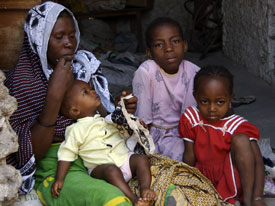An indoor residual spraying campaign in August 2006 carried out by the President’s Malaria Initiative (PMI) sent teams of workers equipped with portable sprayers to treat over 200,000 households with a solution that kills mosquitoes when they come to rest on home walls.
PAJE, Zanzibar
Clothes hanging to dry, chickens roaming around, a dirt-floor kitchen with pots and pans hanging on the wall, bright red tomatoes soaking in a bucket. This is home to Saida Ali Haji and her three children who live in Paje, a dusty, coastal town in Zanzibar.
It is a home no longer hospitable to malaria mosquitoes. An indoor residual spraying campaign in August 2006 carried out by the President’s Malaria Initiative (PMI) sent teams of workers equipped with portable sprayers to treat over 200,000 households with a solution that kills mosquitoes when they come to rest on home walls. All told, the spraying campaign will protect over one million people here from malaria.
Haji, who is 34, learned about the spraying through a village meeting called by the “sheha,” or community leader. There, she was told to remove furniture and food, and cover other belongings with woven mats.
“The spraying has been a good thing,” said Haji, knitting while her 6-month-old son Ali nestled in her lap. “There are not only fewer mosquitoes in our home but also less flies and cockroaches.”
The mother said that malaria is a chronic problem here. Two years ago she had malaria and suffered through fever, joint pain and vomiting. A year ago her 5-year-old daughter Rahma had malaria and seven months ago her 12-year-old daughter Nihifadhi came down with it.
The family has a long-lasting insecticide-treated net – received through the health clinic for free – and one conventional net they bought for about $2 five years ago at a local shop that they must re-treat every three months. Haji sleeps under one of the nets with Ali, while her two older children sleep under the other one. A worker at the health clinic instructed her on how to use them.
“There has been a great change in malaria here because of the availability of nets, medicines to treat malaria and now the recent spraying effort – five years ago we had quite a few malaria cases in children but now we have few cases,” Haji said.

